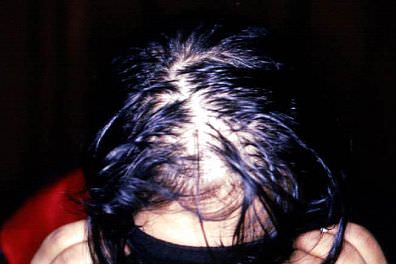Telogen Effluvium
What is Telogen Effluvium?
 Telogen effluvium is the name for temporary hair loss that follows some stress to the system. In a normal healthy person's scalp about 85% of the hair follicles are actively growing hair (anagen) and 15% are resting and shedding (telogen). A hair follicle usually grows hair for 4 years then rests for 4 months. The old hair then falls out and a new hair begins to grow. When the hair rests it changes into a club hair. When the new hair starts it forms under the resting club hair and pushes it out. It is normal to lose up to about 100 hairs a day on one's comb, brush, in the basin or on the pillow, as a result of the normal scalp hair cycle.
Telogen effluvium is the name for temporary hair loss that follows some stress to the system. In a normal healthy person's scalp about 85% of the hair follicles are actively growing hair (anagen) and 15% are resting and shedding (telogen). A hair follicle usually grows hair for 4 years then rests for 4 months. The old hair then falls out and a new hair begins to grow. When the hair rests it changes into a club hair. When the new hair starts it forms under the resting club hair and pushes it out. It is normal to lose up to about 100 hairs a day on one's comb, brush, in the basin or on the pillow, as a result of the normal scalp hair cycle.
What are the causes of Telogen Effluvium?
If there is some stress to the system, as many as 70% of the scalp hairs can be converted from active growing hairs to resting hairs, which are shed. Common events causing this type of stress are:
- Illness
- Operation, surgery, general anesthesia
- Accident
- Childbirth
- Nervous shock or anxiety
- Weight loss or unusual diet
- Discontinuing the contraceptive pill
- Overseas travel resulting in jet lag
- Fever
The resting scalp hairs remain firmly attached to the hair follicles at first. It is only about 2 months after the stressful event that the increased hair shedding is noticed. Often, by the time the shedding is noticed, new hair is usually starting to grow. As the new hair first comes up through the scalp and pushes out the dead hair, a fine fringe of new hair is often evident along the forehead hairline. At first, the shedding of hairs is profuse and a general thinning of the scalp hair may be noted, but after several months a peak is reached and shedding begins to lessen, gradually returning to normal (or near-normal) over 6-9 months.
Because nail and hair growth are under the same influences, an arrest in hair growth is often mirrored in the nails by a horizontal groove coinciding with the time of the stress to the system.
How is Telogen Effluvium treated?
Telogen effluvium is self-correcting. There are no treatments or special shampoos that are consistently helpful. However, gentle handling of the hair, avoiding over-vigorous combing or brushing, and gentle scalp massage may be helpful. You should also ensure a well-balanced diet, with plenty of protein, fruit and vegetables.